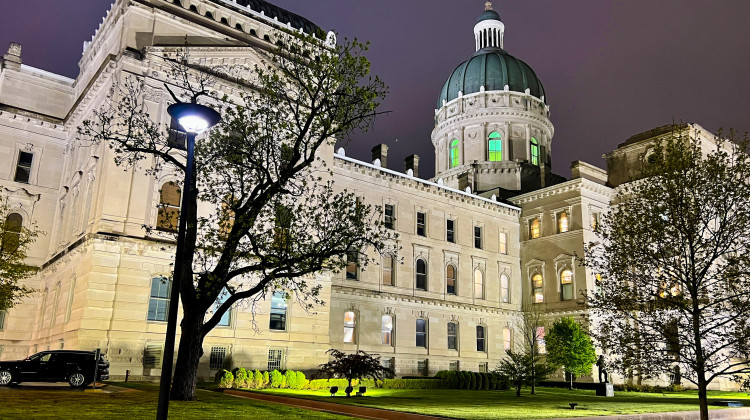
Sarah and Gabriel Bosslet at one of Sarah's early chemotherapy appointments. Gabriel planned to attend all of Sarah's chemotherapy treatments, but after the coronavirus pandemic began, visitors were restricted at the clinic.
Courtesy Gabriel and Sarah BossletThis is part of Essential Voices, a series of interviews with people confronting COVID-19.
Physicians Gabriel and Sarah Bosslet have been married almost 20 years. Sarah was diagnosed early this year with breast cancer. Soon, the world began dealing with another health crisis: the coronavirus pandemic.
The Bosslets spoke with reporter Lauren Bavis about the hard choices they made to balance their essential work in health care and their family’s health and safety.
Sarah: I found out I had cancer January 15th of 2022. I had gone in for a mammogram only because my mom had been diagnosed with breast cancer the week before. Six days after my mom got her diagnosis, I got the same diagnosis.
Gabriel: You know, as a spouse, it's a very, very helpless kind of place to be. So my job sort of became to try as best as I could to wrangle our four kids, but then also to go to her chemotherapy appointments.
Sarah: I had already started chemotherapy. I was two rounds in when the coronavirus issue really came up. One of the worst things to me is that I have to go to all of these appointments, these horrible appointments, by myself.
Gabriel: The one thing I could do is be there for every step. And now you can't even do that. So yeah, it's just, it's a bad feeling.
Sarah: I think early on, when coronavirus really hit here in Indiana, I was very concerned. But honestly, the way that I was the most worried was I was worried about my husband going to the hospital and getting it there and bringing it home.
Gabriel: I am a pulmonary and critical care physician at IU Health and Indiana University School of Medicine. In the United States, pulmonary doctors also are generally the doctors that take care of patients in the intensive care unit. My entire adult life education has sort of led to this. This is probably the defining moment of intensive care medicine ever, period.
Sarah: Gabe and I have four kids. Our twins are 14, and then we have a 10-year-old daughter and a 5-year-old son. And I remember Gabe and I having a conversation where I, you know, I had to be like, “Look, I'm alreadyin a risky situation. And I already had to make sure my will was OK, and I still have surgery ahead of me. If we both are at risk, you know, if you get this coronavirus and get very sick and die and I have breast cancer, you know, then what?”
Gabriel: Being a physician, I think most see it as a calling. You don the armor and you go in to battle and what happens, happens. And it's not that I didn't have the armor, I did. It's just that bringing the enemy home would have been disastrous.
What wound up happening is that my colleagues and my division chair were like, “Look, you're just not going to do the ICU.” A large part of me wants to be there, because this is what I've trained to do. It's like training for a marathon and then the week of getting sick and not being able run, right? I mean, you've done all this preparation, you just want to go. I feel guilty by the fact that others are putting themselves in harm's way to protect me and Sarah.
Sarah: I’m a general pediatrician. If I were able to, I would want to still be in the throes of all of this. ... I know that my partners can do it. I just have a sense of guilt that they have to not only do all of that, but also take care of my patients too. I knew my job was important, but I didn't realize that it was so central to my identity until I had to give it up.
Gabriel: I’m taking two weeks off after Sarah’s surgery to help her recovery. It's my hope that she's doing well for multiple reasons. And it's not the first reason, it's probably the third or fourth, that I want to get back to working in the intensive care unit. But it is, that's a major reason that I want her to get better so quickly.
Sarah: My immune system should improve, and so I'm hopeful that later this summer I can go back to work.
I hope that there's a day in a year or two when I look back and just can't believe that we lived through this.
If you have a personal story to share from the front lines of this pandemic, wherever that may be, email health@wfyi.org.
This story was produced by Side Effects Public Media, a news collaborative covering public health.
Contact reporter Lauren Bavis at lbavis@wfyi.org or follow her on Twitter @lauren_bavis
 DONATE
DONATE






 Support WFYI. We can't do it without you.
Support WFYI. We can't do it without you.